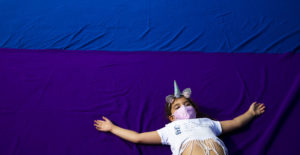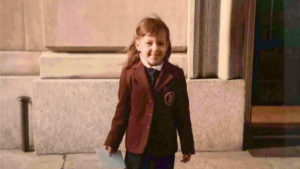Ellen Page — a person who no longer exists, and who by strict application of the rules of gender identity never existed — became famous at the height of an exceptionally dark era for young women and fame. In 2007, Britney Spears shaved her head, Paris Hilton went to prison and Lindsay Lohan was arrested for the first time. And that year, the movie Juno introduced 20-year-old Page to the world as the title character, a 16-year-old who gets pregnant and decides to have the baby.
Critics adored her. “Page’s presence and timing are extraordinary,” enthused Roger Ebert. “I think she will be one of the great actors of her time.” Juno won her an Oscar nomination for best actress. But it wasn’t craft alone that made Page so appealing. It was also something about her as a person — as a girl. In a period when the dominant mode of female celebrity was the “trainwreck”, Page was different. She was big-eyed and skinny, but she didn’t party. She didn’t cycle through boyfriends. She didn’t drink-drive. You never, ever saw her falling out of a club — or out of her clothes.
“If she and her contemporary Lindsay Lohan were put on an attention-seeking sale, they would certainly be at polar ends,” wrote Helen Pidd. “Flashing her crotch getting out of taxis is so not Page’s style (this is just speculation, but she seems like the kind of big-pants gal who wouldn’t even contemplate wearing a thong).”
Page’s peers were quizzed about their sex lives and their scandals. Page talked about politics and feminism. “I think a lot of the time in films, men get roles where they create their own destiny and women are just tools,” she told Pidd. “As a girl, you’re supposed to love Sleeping Beauty. I mean who wants to love Sleeping Beauty when you can be Aladdin?”
Still, Page wasn’t unscathed by the gossip machine. The very fact that she didn’t date, and did dress like a tomboy, raised a whole other set of questions: was she (whisper it) a lesbian? “Is Juno a you know?” asked an article in the Village Voice. Ellen DeGeneres had successfully negotiated coming out in 1997, but she’d done so as the beloved lead of a hit sitcom. Page was only just getting established, and a preference for flannel shirts was hardly compatible with the part of the rising starlet.
It took till 2014 — when Page was 26 — for her to declare her sexuality publicly. “I am tired of lying by omission,” she said in a speech to the Human Rights Congress. The scrutiny of her perceived failure at femininity had taken a toll. She told the audience that a website had recently run photos of her in sweatpants, with the question: “Why does this petite beauty insist on dressing like a massive man?” With audible exasperation, she delivered her answer: “Because I like to be comfortable.”
Page seemed, for a while, happy. She wore suits on the red carpet: an adorable baby butch. She got married to choreographer Emma Portner in 2018. And then, in 2020, Page came out again — this time as transgender. “Dressing like a man” had never merely been about comfort, apparently: it had been about actually being a man.
Page had top surgery — a double mastectomy. In an interview with Time, Page called this “not only life-changing but lifesaving”, and described it as a remedy to the “total hell” of puberty. The public reaction was widely supportive: Netflix immediately announced that it would update the credits on The Umbrella Academy, in which Page stars, to reflect Page’s chosen name. Ellen Page disappeared. Elliot Page emerged instead.
In the Time interview, Page said that the journey to identifying as trans started with reading trans people’s memoirs, in particular Becoming a Man by P. Carl. Through identifying with Carl, “I was finally able to embrace being transgender,” Page says, “and letting myself fully become who I am.” So it makes sense that Page has now contributed his own volume to the genre — Pageboy, released for this Pride month. “An ode to stepping into who we truly are with defiance, strength and joy,” according to the flyleaf.
But Pageboy doesn’t read defiant, strong or joyful. It reads sad: the story of a vulnerable girl thrown into the entertainment business at the age of 10; unprotected by her family; struggling with food; closeted, and reminded by the casual homophobia of Hollywood to stay that way; and subjected to sexual assault and harassment by people who should have been trusted colleagues.
In the memoir, Page says: “At certain points I’ve referred to myself using my previous name and pronouns. This is a choice that felt right to me, occasionally, when talking about my past self, but it’s not an invitation for anyone to do the same.” But talking about Page’s past as though it happened to a boy is nonsensical: Ellen’s experiences are tied to her femaleness, and more than that, her lesbianism.
Not that Page refers to his pre-transition sexuality as “lesbian”: “queer” is preferred, and when the word “lesbian” comes up, it’s marked as something held in contempt, by others if not by Page. At one point, Page calls lesbianism a “repugnant” feature that directors cannot allow on-screen.
Any resistance to compulsory femininity — high heels, tight dresses — is cast by the industry as Page being “difficult”. Roles for women are so sexualised that at one point Page describes Juno as representing “a space beyond the boundary”. This is, remember, a film in which Page’s character is pregnant: you could hardly get a more female role. But because Juno is not “hyperfeminised” — because Page wears tees and jeans for the part — the pressure of gender is lifted, somewhat.
But 2007 was also the year that trans writer Julia Serano published Whipping Girl, which is probably the most influential text in terms of solidifying gender identity theory. In it, Serano argued that “feminine verbal and aesthetic expression” are “driven by intrinsic and deep-seated inclinations that are likely to be the result of biology”. In other words, regardless of your actual sex, if you don’t act or dress “girly”, you might not be a girl at all.
As this idea gained intellectual purchase, femininity standards in popular culture were growing ever more exacting. This pressure was even dramatised in Juno screenwriter Diablo Cody’s follow-up movie, Jennifer’s Body, which starred ultimate hottie Megan Fox as a cheerleader succubus, and Amanda Seyfried as her hoodie-wearing, jealousy-gnarled best friend. The space for the kind of girl-character Page played — girls who were not limited to being objects of desire — was shrinking.
But Hollywood was only amplifying messages Page had heard from her family. Page’s mother informs her daughter that she can “do anything a boy can do”, but from Page’s perspective, this is never sincere. There is continual maternal pressure for Page to be more girly, as well as an absolute rejection of the possibility of homosexuality. One of the few vignettes in which Page recalls his mother being happy is when Page requests a shopping trip to buy “girl clothes” as a teenager. (Page enjoys the way the new wardrobe alters her social standing, but not the way the clothes make her feel about herself.) When Page initially comes out as gay, her mother’s reaction is to yell: “That doesn’t exist!”
Becoming a “transgender guy” doesn’t spare Page from judgement and disgust. (Page still seems wounded by a Jordan Peterson tweet that referred to the surgeon who performed Page’s mastectomy as a “criminal”.) But it does resolve the problem of being a lesbian: Page’s mother, at least, seems better able to accept a trans child than a gay one. “She loves her son endlessly,” writes Page. Transition also makes Page’s body safer — a body that has been repeatedly violated and threatened. Page mentions an “acquaintance” who told her, after she came out for the first time, “I’m going to fuck you to make you realise you aren’t gay.” There’s also a male director who “grooms” her, a male crew member on an early film who forces oral sex on her, and a female crew member on another film who sexually assaults her while presenting it to Page as a consensual relationship. Over and over, Page is informed with violence that her body is not hers.
Again, Hollywood reinforces what began in Page’s childhood. Her adversarial relationship with her body can be seen in her reaction to her stepmother’s cooking. Page hears an “internal voice” saying “no, that can’t go inside you” when she’s confronted with food that scares her: a terror of adulteration, of losing control. Puberty inevitably heightens this. Page describes the age of 11 as “the age I sensed a shift from boy to girl without my consent”. This is, I think, a common sensation for girls: puberty ends an era of uncomplicated, happy embodiment, and launches you into a world where your body appears to invite dangerous attention against your will. Not a shift from boy to girl, but a shift from “person” to “thing”. As Hilary Mantel wrote, some girls want out. They starve themselves, or punish their bodies, and now they have the option to disown their sex entirely.
Trauma is a commonplace of trans memoir, or rather, of trans men’s memoirs. Trans women’s memoirs are, for the most part, exuberant narratives of self-actualisation (albeit usually with some background homophobia, similar to Page’s mother’s). Trans men’s memoirs are often wrenching accounts of rape and self-harm, climaxing in irreversible body modification. Thomas Page McBee’s Man Alive features a harrowing description of the author as a 10-year-old girl being sexually assaulted by her father (the abuse started when McBee was four). It initiated a “split” between self and body. “I felt like a marionette, otherworldly and wooden,” writes McBee, who nonetheless separates his masculine identification from the depersonalisation caused by the abuse.
Carl (in the book that inspired Page) also relates being sexually assaulted at the age of 11 or 12, also by his father: “You’re becoming a woman. Your breasts are beginning to show. I like watching you change,” Carl recalls him saying. Later, the first stage in Carl’s transition is a double mastectomy. “I feel a fiery rage … for what men did to me,” Carl writes, before adding: “I feel so much joy living in a man’s body.”
For Page, these experiences of rejection and violation are incorporated into a story of latent maleness — or rather, of boyness. As the title suggests, there is little interest in being seen as an adult male. Even his new name, Elliot, is inspired by the boy hero of Spielberg’s E.T. Ceasing to be a woman confers a sort of immunity to time. Carl, who transitions in midlife, is spurred to take action by impending menopause: “I knew menopause, becoming an older woman, would kill me, that menopause would shove my femaleness in my face in a way that would make me too sick to live.”
In retrospect, the Noughties insistence that Page was different to the other girls could be seen as an excuse to mistreat her peers: by casting them as sluts in contrast to Page’s “good girl” figure, the media could suggest that they deserved what they got. Yet Page received much the same abuse; and her reaction was not entirely different. Rather than responding with public self-destruction, Page redoubled a private war against her own body — now his body. Britney shaved her head; Page removed her breasts; both cut away what gave them away as female.
It feels a long, sad distance from the woman who once protested that she was entitled to wear whatever made her “comfortable”; longer still from the girl who, back during promo for Juno, spoke up for a woman’s right to be at the centre of her own story. In Pageboy, Page’s girl-self seems passive and tragic: a sleeping beauty, held in suspended animation, afraid to grow up, and kissed without her consent. (There is, I suspect, some retconning here. Achieving a career such as Page’s takes considerable determination, and Page does not suggest this was driven by parental ambition. Yet Page never addresses where this drive to act comes from, or attributes his professional success to more than luck.)
As a “trangender guy”, Page can be Aladdin: the main character, capable of making decisions that affect reality. No more pressure to wear the dress or play the princess. But the fairytale Pageboy reminds me of most of all is the Little Mermaid. In the Hans Christian Andersen original, the mermaid fails to meet the condition of her womanhood. Her suffering ends when she is transformed into one of “the daughters of the air”; finally incorporeal, she makes an impossible, fantastical escape from her betraying body.
On the surface, Pageboy is a euphoric account of Page “finding himself”: the model narrative of the trans memoir. The happy ending is Page waking up in a hospital bed, breastless. Between the lines, though, there’s another story, of a self-hating girl who engineers a flit from femininity. It’s obligatory now to be shocked by the cruelty of Noughties culture. When, I wonder, will we recognise the even greater cruelty of inviting women and girls to barter their body parts for self-determination?
*
Sarah Ditum’s Toxic: Women, Fame and the Noughties is available to pre-order.
Disclaimer
Some of the posts we share are controversial and we do not necessarily agree with them in the whole extend. Sometimes we agree with the content or part of it but we do not agree with the narration or language. Nevertheless we find them somehow interesting, valuable and/or informative or we share them, because we strongly believe in freedom of speech, free press and journalism. We strongly encourage you to have a critical approach to all the content, do your own research and analysis to build your own opinion.
We would be glad to have your feedback.
Source: UnHerd Read the original article here: https://unherd.com/




